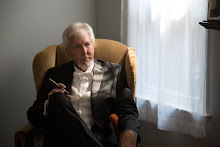Several years ago I had the opportunity to write for publication a non-fiction piece about the experience of watching my mother suffer and die from complications arising from Parkinson’s disease. Going into the project I was more than a little hesitant. It had been merely three years since her passing, and I was worried that I wouldn’t be able to keep the proper distance between myself as the narrator and the deep emotion I was sure to conjure up. Fortunately I was able to maintain that distance, and although recounting the experience was at times painful, I was also able to come to some closure. In short, I found the experience therapeutic.
For the last couple of weeks I’ve been working on a similar piece about my dad’s death, which occurred a little more than seven years ago, and I’ve found this project — the search for closure and the reasons for the disconnection we endured most of our lives — to be equally therapeutic.
Memoirs have become popular today, and writing about the death of a loved one can often facilitate the healing process, but many new writers make the mistake of focusing the piece on themselves, which gets in the way of the reader’s enjoyment. Remember that the reader must be given the freedom to relate to your memoir in their own way.
When I read Saving Milly, Morton Kondracke’s account of his wife’s battle with Parkinson’s, I immediately related because his story mirrored my own experience. Yet my girlfriend, who also read Milly, related to Kondracke’s story not because she knew my mother, or knew anyone who’d suffered from Parkinson’s, but because Kondracke had allowed her to experience his plight in her own way. My girlfriend has experienced the loss of loved ones and so Kondracke’s story, while not identical to hers, mirrored the pain she felt while watching her deeply beloved grandfather and mentor prepare for death.
The key, therefore, to writing any memoir is to avoid the pratfall of becoming too Hallmarky, too syrupy. Don’t inject huge amounts of your own feelings into the piece; instead you must become the outside observer. You can still elicit the emotion from your reader, but the reader must experience their own emotions, not yours.
On Mother’s Day and Father’s Day, many of us no longer have the joy of spending each holiday with Mom and Dad, brunch or a ballgame. Yet there is no greater honor one can pay their parents than to write about them, how they influenced, what they meant to you. And you don’t necessarily have to have had a wonderful relationship with them when they were alive to write about them. If you don’t believe me, maybe you’ll believe Maya Angelou: “I've learned that regardless of your relationship with your parents, you'll miss them when they're gone from your life.”
Friday, December 01, 2006
Subscribe to:
Post Comments (Atom)

1 comment:
I'm thrilled to see you are still writing. Hope all is well with you. I will always remember SUPC.
Post a Comment